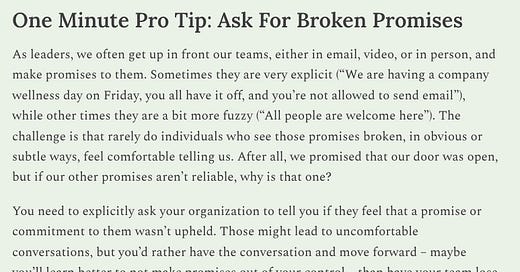The Paradox of Opposing Advice
Sometimes, we tell individuals one thing, and organizations another, and the tension in between cause confusion.
Leadership Moment: Missed Shoutouts
I recently completed my one thousandth ride on my Peloton, and, like most riders, I planned my schedule to do it during a live ride, in hopes of getting a shoutout from one of my favorite instructors. Unfortunately, that day the class was short, and only in-studio riders were celebrated for their milestones. Not a huge downer, but I, like most people, like having my little victories celebrated, and I missed that moment (but now you can all share it with me).
Ironically, a few days later I was in a ride where the instructor said (paraphrased due to oxygen-deprivation when I heard it ;), “If I missed your shoutout, I’m sorry, but remember, you aren’t doing this for the shoutouts. You’re doing this because it’s what you want to do, and you know you made that milestone.” It’s helpful to remember that while we as organization leaders want to create an environment that has a lot of inclusive practices – like celebrating shared victories – we as individuals need to build the resilience in ourselves to not require those practices to function.
One Minute Pro Tip: Ask For Broken Promises
As leaders, we often get up in front our teams, either in email, video, or in person, and make promises to them. Sometimes they are very explicit (“We are having a company wellness day on Friday, you all have it off, and you’re not allowed to send email”), while other times they are a bit more fuzzy (“All people are welcome here”). The challenge is that rarely do individuals who see those promises broken, in obvious or subtle ways, feel comfortable telling us. After all, we promised that our door was open, but if our other promises aren’t reliable, why is that one?
You need to explicitly ask your organization to tell you if they feel that a promise or commitment to them wasn’t upheld. Those might lead to uncomfortable conversations, but you’d rather have the conversation and move forward – maybe you’ll learn better to not make promises out of your control – than have your team lose more trust in you as a leader.
Appearances
Recently published
Studio recording of Stop Destroying Value: 6 Leadership Disciplines.
Future
Aug 9: Reducing Your Team’s Energy Costs: An Inclusion Microtalk (likely virtual), at Black Hat USA
Aug 30: The Perkins Platform
Sep 20: SANS CISO Roundtable
Oct 20: Triangle Infoseccon, Leadership Track
Interested in having me speak at an upcoming event? Contact me via speakers@duha.co.
Chapter Cameo: Selective Attention
If you’re not familiar with Selective Attention, I highly recommend watching this video now, as it’ll make the rest of this paragraph make a bit more sense. Chapter 45 of 1% Leadership takes the concept of selective attention and drives it to the organizational level: when we have our eye on organization and team needs, it can be easy to not notice that individual needs – even the ones we loudly say matter to us – are being ignored. We want our individuals to be resilient and take care of themselves; but as leaders, we have to build systems that build safe places for those individuals to grow.



